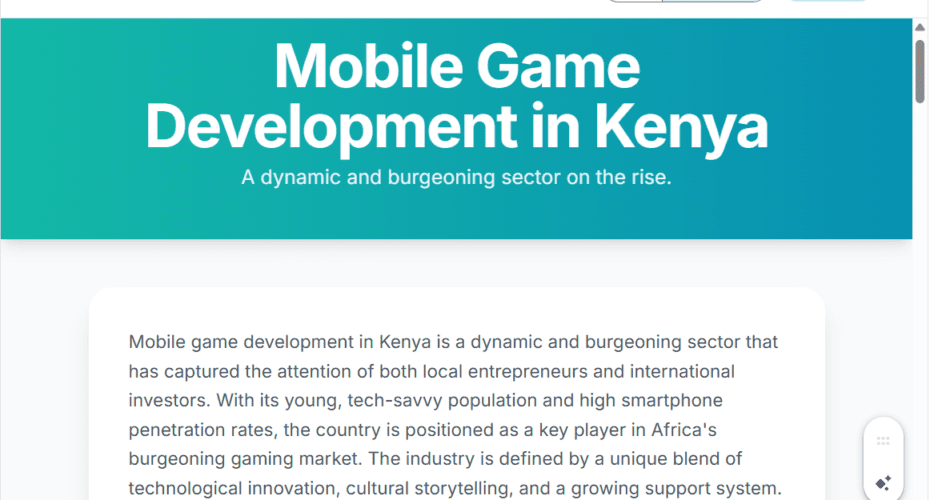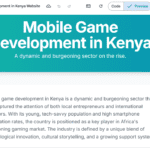Mobile Game Development Kenya:
- Delivery Time2 Weeks
- English levelProfessional
- LocationUSA, United Kingdom, United Arab Emirates, New York, Nairobi, Kilimani, Kenya, Dubai, CBD Nairobi, Canada, Australia
Service Description
The cost of Mobile Game Development in Kenya is 1500000KES.Get Mobile Game Development in Kenya at a price of 1000000KES at Black Shepherd Technologies.
Discover the thriving mobile game development scene in Kenya. Explore a growing market, local developers creating culturally relevant games, and opportunities for both aspiring developers and international studios.
Mobile game development in Kenya is a dynamic and burgeoning sector that has captured the attention of both local entrepreneurs and international investors. With its young, tech-savvy population and high smartphone penetration rates, the country is positioned as a key player in Africa’s burgeoning gaming market. The industry is defined by a unique blend of technological innovation, cultural storytelling, and a growing support system.
Market Dynamics and Growth
The Kenyan gaming market is experiencing significant growth, with a vast majority of the population accessing games through their mobile devices. This is driven by the increasing affordability of smartphones and improving internet infrastructure, including the expansion of 4G networks. This mobile-first environment has created a fertile ground for developers to reach a wide audience, with free-to-play games and in-app purchase models being particularly popular. While the average revenue per user (ARPU) may be modest compared to more developed markets, the sheer size of the user base presents a substantial opportunity for monetization. The market’s trajectory is on a clear upward trend, attracting foreign investment and partnerships aimed at tapping into this potential.
A Focus on Local Content and Storytelling
A defining characteristic of the Kenyan mobile game development scene is its emphasis on creating culturally relevant games. Developers are leveraging the rich tapestry of African history, folklore, and contemporary life to craft unique narratives that resonate with local audiences and offer a fresh perspective to global players. This focus on authentic storytelling is helping to differentiate Kenyan games from the multitude of international titles and is fostering a sense of identity within the local gaming community. Companies like Leti Arts and Usiku Games are pioneers in this space, creating games and digital comics that celebrate African heritage and showcase it to the world.
The Rise of Mobile Esports
The growth of mobile gaming has gone hand-in-hand with the rise of esports in Kenya. The accessibility of mobile devices has democratized competitive gaming, allowing a broader and more diverse group of individuals to participate. The Esports Kenya Federation (ESKF) has been instrumental in formalizing and promoting the scene, organizing tournaments for popular mobile titles and providing a platform for local talent. This has not only boosted the visibility of Kenyan gamers but also created new avenues for game developers, tournament organizers, and content creators to collaborate and build a vibrant community. The official recognition of ESKF by the National Olympic Committee of Kenya further solidifies the legitimacy of esports as a professional sport in the country.
Supporting Ecosystem and Talent Development
Kenya’s government and a growing number of community organizations are actively working to build a supportive ecosystem for the creative and tech industries. The “Silicon Savannah” initiative, a long-term plan to foster a tech-driven economy, has created a favorable environment for startups, including game studios. Organizations like the Kenya Film Commission (KFC) have also expanded their focus to include gaming and animation, providing resources and training to aspiring creatives. For instance, the collaboration between the KFC and institutions like Dedan Kimathi University of Technology (DeKUT) has led to the establishment of hubs that offer training and equipment. These initiatives, along with a growing number of developer meetups and hackathons, are fostering a strong community of developers, artists, and designers, who are honing their skills in popular game engines like Unity and Godot.
Challenges and Opportunities
Despite the remarkable progress, the Kenyan mobile game development industry faces several challenges. Securing adequate funding remains a major hurdle for many independent studios, as traditional investors may be hesitant to back a relatively nascent industry. Additionally, navigating a highly competitive global market and establishing sustainable monetization models requires strategic thinking and innovation. However, these challenges also present unique opportunities. The fragmentation of the African market means that developers who can successfully create localized content and payment solutions are in a prime position to succeed. The rise of hybrid monetization strategies, which combine in-app purchases with rewarded advertising, is proving effective. Furthermore, the increasing interest from global publishers and investment firms in African content is opening up new avenues for collaboration and funding.
In conclusion, the mobile game development scene in Kenya is a testament to the country’s creative potential and technological ambition. It is a sector driven by a passion for storytelling, a growing community of talented developers, and an expanding market ready for innovative content. With continued support from government bodies, community organizations, and a focus on both local relevance and global appeal, Kenya is well on its way to becoming a significant force in the international gaming industry.
This video provides an overview of the challenges and opportunities for scaling games in Africa, featuring insights from industry leaders.








